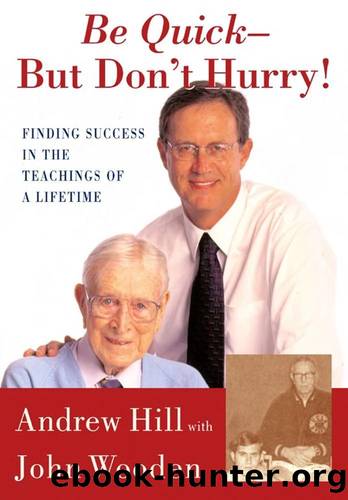Be Quick - But Don't Hurry: Finding Success in the Teachings of a Lifetime by Andrew Hill & John Wooden

Author:Andrew Hill & John Wooden [Hill, Andrew & Wooden, John]
Language: eng
Format: epub
Tags: Business & Economics, Management, General, Biography & Autobiography, Sports
ISBN: 9780743224215
Google: qtxP6fO_ss4C
Publisher: Simon and Schuster
Published: 2002-04-21T23:00:00+00:00
Then you’d say, “Why don’t you try it.
I have shown you how to be.”
IMITATION—I attempted,
As you watched me lovingly.
“Do it this way. Do it that way.
Try it once again like this.”
Your CORRECTION drilling habit,
As we watched my skills progress.
With occasional assistance,
You retreated humbly.
You were finished—I had learned it.
REPETITION was the key.Coach’s greatest gift is notwhathe taught us, but the fact that he really taught us how tolearn.Bill Walton, one of the two greatest centers in the history of college basketball, tells a wonderful story of his life after the NBA that really makes this lesson clear. Bill always set his goals extremely high, and his post-playing aim was to make a career in broadcasting. His ability to speak clearly when he was in college was limited at best; it wasn’t until he was in his late twenties that, with the help of the New York–based broadcasting legend Marty Glickman, Bill really taught himself to speak clearly. Glickman gave him a short set of general tips on how to improve his speaking, and then implored Bill to apply the learning techniques he had learned from Coach Wooden. Glickman’s tips included slowing your thoughts down and not hurrying, practicing your weaknesses by reading out loud, watching yourself in the mirror, and being unafraid to make mistakes. Sound familiar? Bill integrated these tips into Coach’s laws of demonstration, imitation, correction,and repetition. Bill sure learned his lessons well; at times, I think everyone who hears Walton on TV longs for the days when he barely spoke at all. To this day, Coach Wooden always tells Bill that he talks too much.
There are several other teaching principles that Coach integrated into his coaching techniques that can be emulated in any workplace. He believed in ending practice on time, and he always wanted to go out on a fun and positive note. He’d set up either a shooting game or some sort of contest, something that brought us together as a group so we went out on a high note. He emphasizes this point in clinics he gives to young coaches by saying “It’s always wise to end practice on a high note. It’s good to go home on a high note. Particularly when you are a young coach. When you’re older, it doesn’t make that big a difference.”
Finding ways to end workdays on an up note is a positive challenge for all managers. Coach also found in his teaching days that complicated theories and concepts were best introduced at the beginning of class, before a fatigue factor set in. This was even more evident on the basketball court. This same principle applies whenever you’re teaching your group new things, or when you’re scheduling important meetings. We’ve all gone to late-in-the-day sales meetings where the buyer could barely stay focused. Try to set up big meetings for early in the day, before you have to fight fatigue.
Many managers expect their employees to know all the intricacies and nuances of their jobs from the day they start work.
Download
This site does not store any files on its server. We only index and link to content provided by other sites. Please contact the content providers to delete copyright contents if any and email us, we'll remove relevant links or contents immediately.
| Ethics | Etiquette |
| Fashion & Image | Health & Stress |
| Motivation & Self-Improvement | Work Life Balance |
| Workplace Culture |
Tools of Titans by Timothy Ferriss(6937)
Change Your Questions, Change Your Life by Marilee Adams(6637)
Deep Work by Cal Newport(5452)
Man-made Catastrophes and Risk Information Concealment by Dmitry Chernov & Didier Sornette(4729)
Big Magic: Creative Living Beyond Fear by Elizabeth Gilbert(4719)
The Slight Edge by Jeff Olson(4716)
The Motivation Myth by Jeff Haden(4521)
Digital Minimalism by Cal Newport;(4512)
Stone's Rules by Roger Stone(4413)
Ego Is the Enemy by Ryan Holiday(3982)
The Laws of Human Nature by Robert Greene(3936)
Tuesdays with Morrie by Mitch Albom(3830)
Rising Strong by Brene Brown(3777)
Eat That Frog! by Brian Tracy(3509)
Skin in the Game by Nassim Nicholas Taleb(3456)
The Money Culture by Michael Lewis(3277)
Skin in the Game: Hidden Asymmetries in Daily Life by Nassim Nicholas Taleb(3259)
Believe It to Achieve It by Brian Tracy & Christina Stein(3201)
Bullshit Jobs by David Graeber(3173)
